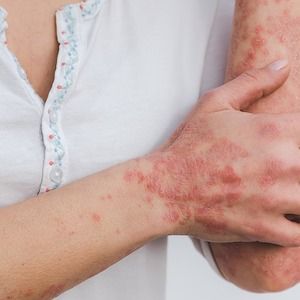Article
Oral Roflumilast Effective, Safe in Treating Plaque Psoriasis Over 24 Weeks
Author(s):
New late-breaking data showed that oral roflumilast treatment was both safe and efficacious against psoriasis, making it a potentially less expensive and convenient treatment alternative.

Treating moderate-to-severe plaque psoriasis with oral roflumilast led to substantial improvements in Psoriasis Area and Severity Index (PASI) scores compared to placebo, according to new data.1
This late-breaking data was presented by Alexander Egeberg, MD, PhD, at the American Academy of Dermatology (AAD) 2023 Annual Meeting in New Orleans, LA. Egeberg is a professor of dermatology at the University of Copenhagen and Bispebjerg Hospital in Denmark.
The drug is a targeted phosphodiesterase (PDE)-4 inhibitor, and PDE-4 is involved in psoriasis pathogenesis. That being said, the Egeberg and colleagues noted that the efficacy and safety of oral roflumilast for those with psoriasis is still unclear.
The investigators conducted a multicenter, randomized, double-blind, placebo-controlled study in which they randomized participants 1 to 1 to be treated with oral roflumilast (500 μg once-per-day) or a placebo.
The placebo arm of the study was switched to being treated with roflumilast at 12 weeks through to week 24. The investigators determined their primary endpoint would be a 75% or greater PASI score reduction from baseline at 12 weeks.
The investigators ended up randomizing 46 total participants, finding that by 12 weeks 34.8% of treatment group participants were able to reach PASI75 compared to 0.0% of the placebo group. They also found 65.2% had PASI50, 43.5% had PASI75, 21.7% had PASI90, and 8.7% of patients had PASI100 responses at 24 weeks.
The investigators also noted that the most common adverse events reported in both arms of the study were weight-loss, headaches, transient gastrointestinal symptoms, and insomnia.
The investigators also concluded that, given this data, roflumilast may end up becoming a cheaper alternative therapy to other psoriasis drugs.
References
- Efficacy and safety of oral roflumilast in the treatment of moderate-to-severe psoriasis – a randomized, double-blinded, placebo-controlled trial (PSORRO). Paper presented at: American Academy of Dermatology 2023 Annual Meeting; March 17 – 21. New Orleans, LA. Accessed March 20, 2023.





